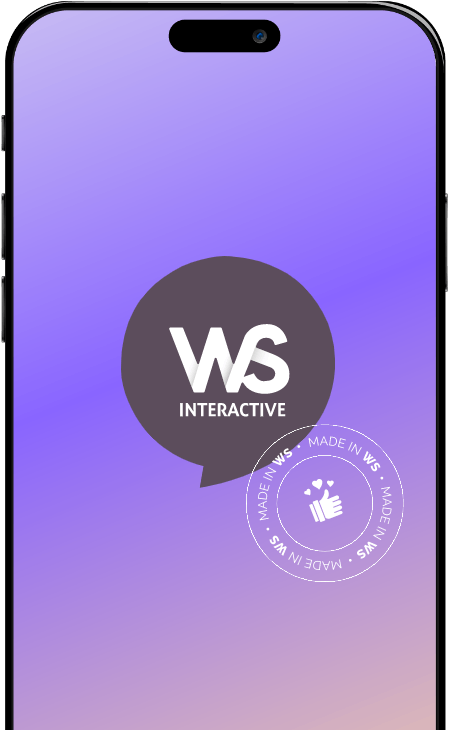Mobile app
The web agency can help you with your project!
Our web agency can help you with your app creation project.
User experience (UX), Mobile First design and technical features… Our team of experts will accompany you from the design of your application to its final publication on the stores.
Let’s work together to design aintuitive, high-performance mobile appto reach your goals!
Our support for your app creation project
Mobile First or responsive design (PWA)
UX-UI consulting, User experience
Creation of customized web design

Web or native app development
Powerful, customized Apps functionality
Content support
Why choose an app for your business?
Reach over 85% of of the population with Mobile First Design
Choose the medium you use most to surf the Internet.
Accounting for more than 75% of time spent on the Internet, cell phones are now the medium of choice for reaching the greatest number of people.
Mobility & portability first and foremost
If the mobile has become the number 1 medium, it’s above all for its ease of use .
Do your users need to have your tools & information at hand, even when traveling or in the field?
A mobile application will meet their needs.
Let’s create the mobile application you need!
Native or web application?
Whatever the means, our aim is to create tailor-made solutions optimized for your business.
Each of our creations is unique to meet your specific needs and create an exceptional application!
- Functional specifications
- UX-UI design
- Green-coding
- Follow-up and strategic advice
Convinced?
THEY PUT THEIR TRUST IN US
Their mobile application & PWA project
CPS EAU
To meet the specific needs of CPS EAU, we developed a tailor-made PWA integrating both technical operations management and HR issues.

Bouquetin Pyrénées
The creation of a web application to report Ibex sightings in the Pyrenees!

Restofuté
A complete, tailor-made technical overhaul of the Restofuté website to develop an even more efficient system that listens to its users.

Tables & Auberges
Find out how WS Interactive cooked the winning recipe for an app that combines UX and location-based search. A mobile app worthy of the greatest chefs.

FAQ
Questions about your application creation project?
The web agency responds!
What is a Mobile App?
These apps can be designed to deliver video games, online services, organization and productivity tools, as well as real exchange or e-commerce platforms, in mobile format.
Their strength: offering digital services and an optimized user experience on mobile, by adapting design and interface to the reduced screen size, while taking advantage of the portability of mobile devices, the #1 advantage of mobile over PC.
These mobile apps are generally available for download from application distribution platforms, such as the App Store for Apple devices and the Google Play Store for Android devices.
What is a PWA?
.
Simply put, it’s a mix between a website and an application: your web application can be consulted on both mobile and computer, unlike so-called “native” applications, which are generally only consultable on mobile.
Unlike traditional (native) applications, PWAs don’t require downloading from an app store, and can be accessed directly via a web browser on any device, whether desktop, smartphone or tablet.
In a nutshell :a PWA is a web applicationthat offers a user experience similar to that of native applications, but whichaccessible via a web browser, without the need to download from an app store.
What are the advantages of PWA?
Here are a few key points to help you decide in favor of Web Applications (or PWAs):
Cross-platform mode : with or without download, PWAs work on all types of devices to deliver your content on computers, smartphones and tablets. With PWA, you’ve got an all-in-one solution! A website + a mobile application. What more could you ask for?
–Online referencing: like traditional websites, PWAs are referenced by search engines. By building your app’s content properly, you’ll be able to benefit from the visibility offered by Search Engine Optimization (SEO) and attract new users, even outside the Stores. Don’t hesitate to ask your web agency for advice on how to boost your application’s SEO!
– Easier access to your contentPWAs can be used on all devices, regardless of the type or version of operating system (OS). Whether your target users use x or y version of Apple, Windows, Linux or Android, your application will be accessible to them without the need for OS downloads or updates. Your users will even be able to add your PWA to their home screen without having to go through the app store, making it even easier to install, and encouraging them to take action!
– Mises à jour automatiques : les PWA se mettent à jour automatiquement, sans nécessiter d’intervention de vos utilisateurs. Vous êtes donc assurés que vos utilisateurs disposent tous de la dernière version de l’application, pour assurer la sécurité de l’application et de ses contenus.
– Controlled hosting PWAs don’t have to be hosted on application distribution stores. You are free to choose the host for your application, just as you would for a website. Perhaps this is a good opportunity for green, high-performance, RGPD-compliant hosting to get you on the responsible digital path?
– Sécurité renforcée : les PWA utilisent notamment le protocole HTTPS pour assurer la sécurité des données. En choisissant votre hébergeur, vous pouvez également définir le niveau de sécurité et vous assurer de la conformité RGPD de votre application. Your content and your users’ data will be safe there.
– Optimized performance: thanks to the latest web technologies, PWAs are designed to be fast and responsive, offering a fluid user experience even in difficult network conditions.
In a nutshell :PWAs offer cross-platformcross-platform accessibility, optimized performance, a fluid user experience and controlled security ,making them an attractive solution for any mobile application project.
What are the advantages of a native mobile application?
Here are just a few of the advantages of native mobile applications:
– Good integration with the operating system : native applications are seamlessly integrated into the device’s ecosystem, delivering a more seamless and familiar experience for users.
– Access to advanced functionalities and device customization: native applications have advanced access to the functionalities of the mobile device on which they are installed. Use of camera, GPS, brightness, motion and gyro sensors, notification system and settings preferences… These features enable you to create rich, highly customizable experiences for your users.
– Offline useSome native applications can operate in offline mode or with a weak Internet connection, enabling users to access their functions and content even when they’re off the network.
– Distribution on app stores : distributing the native application on app stores enables us to reach a wide audience and benefit fromapplication performance analyses.
– Sécurité avancée : en fonction de leur développement, les applications natives peuvent offrir une sécurité renforcée à leurs utilisateurs, grâce à l’exploitation d’algorithmes de cryptage et de protection des données intégrés dans les systèmes d’exploitation mobiles.
In a nutshell: native applications allowaccess to advanced device functions thanks to improved integration with the operating system,a personalized user experienceandmore or less enhanced safety,making it a compelling technology for certain mobile application projects.
What’s the difference between a native application and a web application?
So, technologies aside, what’s the difference between web and native mobile applications?
Your web agency takes stock:
– Development: languages, technologies and development methods vary from one type of application to another. Web applications, as their name suggests, use web languages. Native applications, on the other hand, are developed specifically for a particular platform, such as iOS or Android.
– Functionalities: native applications have more advanced access to mobile functionalities (camera, GPS, sensors, notifications, etc.). Web applications are more limited in their access to the device’s deeper functionalities, and therefore depend overall on browser functionality (less advanced than the device’s native functionalities).
– Support:native mobile applications are only compatible with mobile devices (smartphones or tablets). Web applications, on the other hand, can be consulted and used on computers, tablets and mobiles, using any browser.
– Distribution: native applications are only available for download via app stores such as theApp Store or the Google Play Store. Web applications, on the other hand, require no download: they can be accessed directly from a URL link via any browser, on PC or mobile. They can be downloaded from the same app stores as native applications, but this is optional.
– Hosting: native applications are hosted on app stores. You have no control over their approval, management or hosting of the data you use. Web applications, on the other hand, require no download: they can be accessed directly from a URL link via any browser, on PC or mobile. They can be downloaded from the same app stores as native applications, but this is optional.
– Referencing: unlike native applications, which are only referenced via their distribution stores (App Store, Google Play Store…), web applications can be referenced on search engines, and therefore form part of a natural SEO strategy.
– Update: updates to a web application are automatically distributed and applied to all users, whether they consult it via a browser or have downloaded the application to their device. On the other hand, updating a native application generally requires user consent, or manual action.
To sum up :native applications generally offerand a more personalized user experience,while web applications areless costly to develop, deploy and maintain, while offering cross-platform accessibility. But in the end, what should you choose between PWA or native App for your mobile application project? The choice between the two depends on project needs and possibilities, required functionality and user experience preferences.
Your web agency can of course advise you on this. Don’t hesitate to call on us to help you think strategically, functionally and technically!
Why adopt a mobile-first strategy?
Properly executed, this user-centric strategy can help improve your site’s/application’s visibility on search engines, boost user engagement and even increase conversions by optimizing the user experience and journey on mobile .
Approche évidente pour les projets d’application mobile et application web, le Mobile First peut également s’appliquer pour les sites internet.
Your web agency can advise you on the design strategy for your project.
So, are you ready for the mobile adventure?
Bring your ideas to life✧
Let’s build your project together!
Accompagnement Design UX-UI
Our UX-UI design combines the art of the User Journey with an elegant and functional interface to create seamless navigation, all the way to conversion.
Mobile App Conception and Dev
Our teams develop tailor-made web and mobile applications, adapted to your audience and your business challenges, to create a direct connection with your users and prospects.eurs et prospects.
Intranet / Extranet development
We design intranet and extranet sites tailored to your business, to boost your productivity with ease.
SEO Support
Our SEO consulting and support service helps you strengthen your SEO strategy, to reach a qualified audience for your business.
